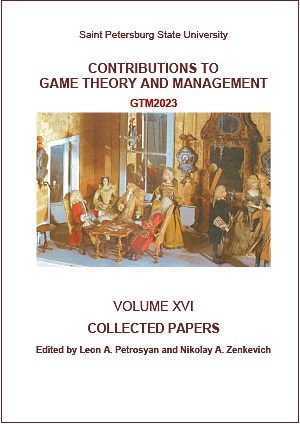Cooperative Stock Market Game
Abstract
This study explores the game-theoretic model of the stock market, analyzing the behavior and strategic choices of market participants, and constructing a cooperative game model. The basic concepts of game theory are introduced, and the importance and practical application of game theory in the stock market are explained. A cooperative game-theoretic model is constructed, the characteristic function is established, and its superadditivity is proven. The model is analyzed, the Shapley value is derived. It is demonstrated that the Shapley value belongs to the core.
Keywords:
cooperative game, core, Shapley value, stock market
Downloads
References
Agbo, M., Rousselière, D. and Salanió, J. (2015). Agricultural marketing cooperatives with direct selling: A cooperative–non-cooperative game. Journal of Economic Behavior & Organization, 109, 56–71.
Allen, F. and Morris, S. (2013). Game theory models in finance. Game theory and business applications. Boston, MA : Springer US, 17–41.
Karnani, A. (1984). The value of market share and the product life cycle — A game-theoretic model. Management Science, 30(6), 696–712.
Lee, P. M. (1997). A comparative analysis of layoff announcements and stock price reactions in the United States and Japan. Strategic Management Journal, 18(11), 879–894.
Moorthy, K. S. (1993). Competitive marketing strategies: Game-theoretic models. Handbooks in operations research and management science, 5, 143–190.
Petrosyan, L., Sedakov, A. (2014). A Multistage network games with perfect information. Automation and Remote Control, 75(8), 1532–1540.
Shandilya, S. (2022). Modeling and Comparative Analysis of Multi-Agent Cost Allocation Strategies Using Cooperative Game Theory for the Modern Electricity Market. Energies, 15(7), 2352.
Sutton, J. (1996). Game-theoretic models of market structure. Economics of Industry, EI 15.
Ullah, M. (2021). Game Theory and Stock Investment. Multicultural Education, 7(6), 40–44.
Yeung, D.W.K., L. Petrosyan, L. (2012). Subgame Consistent Economic Optimization. New York: Birkhauser, 395 p.
Downloads
Published
How to Cite
Issue
Section
License
Articles of "Contributions to Game Theory and Management" are open access distributed under the terms of the License Agreement with Saint Petersburg State University, which permits to the authors unrestricted distribution and self-archiving free of charge.




